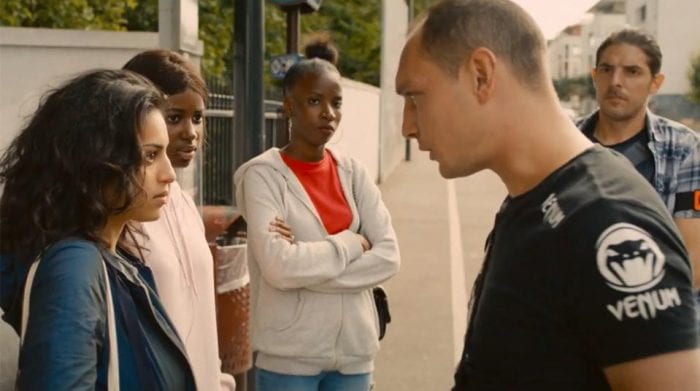Movie Review: ‘Les Misérables’ — A modern tale of injustice on the streets of Paris
By Jeffrey Sanzel
Ladj Ly’s Les Misérables is not another remake of the Victor Hugo novel, nor does it have anything to do with the musical blockbuster or its clumsy cinematic version. In fact, it only nods to the original source in slight but ultimately important ways.
This Les Misérables is set in the French commune of Montfermeil in 2018. In the novel, Montfermeil is where Jean Valjean rescues the abused child Cosette. In addition, the title has been translated as The Miserables, The Wretched, The Miserable Ones, The Poor Ones, The Wretched Poor, The Victims and The Dispossessed. Any of these would apply to the denizens of the contemporary Montfermeil. (Contrary to various sites, Hugo did not write Les Misérables in Montfermeil, but rather when he was in exile, living in Guernsey.)
The film opens in Paris, just after the French victory at the 2018 FIFA World Cup. It is a scene of celebration and harmony, where people of all ethnicities joyously connect. This is the sole moment of unity to be seen in the next ninety minutes.
 Quickly, the action shifts to Les Bosquets, Montfermeil’s most notorious and crime-ridden social estate. Police officer Stéphane Ruiz, an emotional and moral core as played in a brooding, heartfelt performance by Damien Bonnard, has arrived for his first day, having been transferred from Paris, to join the anti-crime brigade. He is placed with the high-strung, abusive, and sadistic Chris (Alexis Manenti, dangerously mercurial) and the more laid-back Gwada (understated but wholly engaging Djebril Zonga), who grew up in the neighborhood.
Quickly, the action shifts to Les Bosquets, Montfermeil’s most notorious and crime-ridden social estate. Police officer Stéphane Ruiz, an emotional and moral core as played in a brooding, heartfelt performance by Damien Bonnard, has arrived for his first day, having been transferred from Paris, to join the anti-crime brigade. He is placed with the high-strung, abusive, and sadistic Chris (Alexis Manenti, dangerously mercurial) and the more laid-back Gwada (understated but wholly engaging Djebril Zonga), who grew up in the neighborhood.
Chris and Gwada have been working this area for the past decade. At one point, the hairpin-triggered Chris states,“I am the law.” It is horrifyingly comic and twistingly reflective of how this community functions. It is just as skewed as Hugo’s wrongheaded but self-righteous policeman Javert. (However, it should be noted, Javert is many things but crooked is not one of them.)
The plot centers around a teenager, Issa (a piercing Issa Perica), who has stolen a lion cub from a Roma circus and posted a picture on Instagram. This causes great unrest in the already volatile zone, divided by race and religion.
Stéphane, Chris, and Gwada attempt to locate and return the cub, revealing the corrupt and cruel underpinnings of the area, ruled over by a mayor (played with a sly, controlled charm by Steve Tientcheu), an arch and accomplished manipulator.
Confrontations ensue with the citizens of both African and Arab decent; the Muslim Brotherhood, run by former felon Salah (the subtlety dimensional Almamy Kanoute); drug dealers; and hordes of almost feral teenagers.
 Even after they locate Issa, it is an act of violence — revealed to be not as accidental as it first seems — that drives the latter part of the film. From then on, it is a race between the police officers and the various residents to track down the video from Buzz (wide-eyed and fearful Al-Hassan Ly), the boy whose drone recorded the incident. It all builds to a showdown that is both a literal and figurative conflagration.
Even after they locate Issa, it is an act of violence — revealed to be not as accidental as it first seems — that drives the latter part of the film. From then on, it is a race between the police officers and the various residents to track down the video from Buzz (wide-eyed and fearful Al-Hassan Ly), the boy whose drone recorded the incident. It all builds to a showdown that is both a literal and figurative conflagration.
The film depicts a wide range of abuses against poor citizens. To label them all as victims is to oversimplify and to take away the social and fiscal complexity of the issues. Many of them are held back by conditions beyond their control; but their reactions are often brutal and disproportionate, fueled by a distrust and deep-seeded anger.
This is a world of temporary alliances but no allegiances. Amongst themselves there is hierarchy but no respite or solace. It is a constant struggle for survival through power and dominance and unflinching brutality. And, at the bottom, there are the disenfranchised teenagers of various ethnicities, portraits of seething unrest.
The film quotes Hugo: “Remember this, my friends: there are no such things as bad plants or bad men. There are only bad cultivators.” It is a reminder that this actions are the consequences of societally-made circumstances.
Ladj Ly has directed this film with a relentless anxiety. Every moment is tension-filled; even in stillness, it holds its breath. The clock is always ticking and the countdown is to another moment of destruction in a sphere that is wracked by crime and poverty.
One thing this Les Misérables shares with the original is its look at the law — not in black and white but in shades of terrible grays. But this is to be expected in a universe where an eye-for-an-eye can become literal. If you were looking for a film with clear good and bad and right and wrong, this is not it. But if you want to be challenged, Les Misérables will resonate with a unique and unsettling power.
The final moment is the perfect metaphor: a Molotov cocktail burning down. Where it lands, remains to be seen.
In French with English subtitles, Les Misérables (Rated R) is now streaming on Amazon Prime.
Photos courtesy of Amazon Studios







